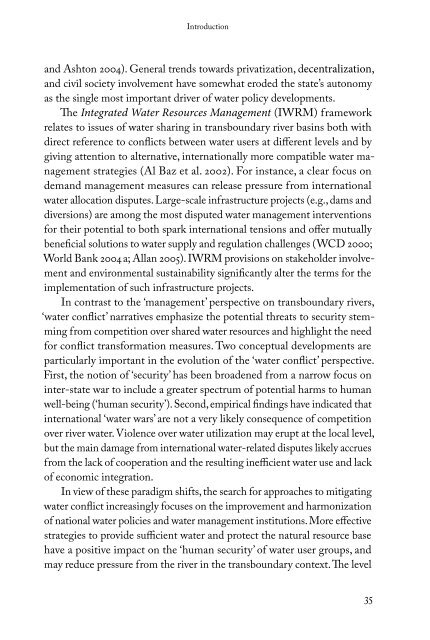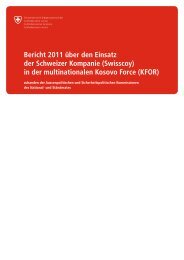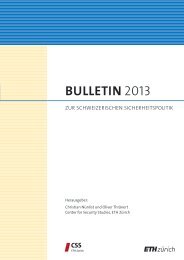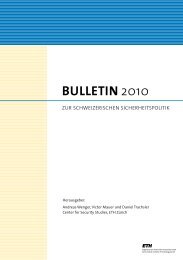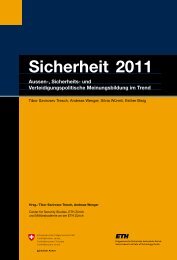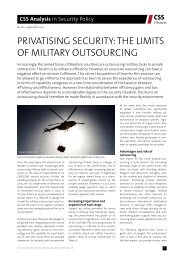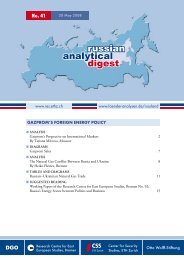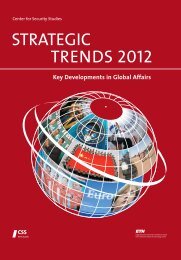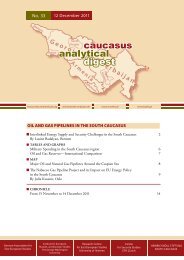Double-Edged Hydropolitics on the Nile - Center for Security Studies ...
Double-Edged Hydropolitics on the Nile - Center for Security Studies ...
Double-Edged Hydropolitics on the Nile - Center for Security Studies ...
Create successful ePaper yourself
Turn your PDF publications into a flip-book with our unique Google optimized e-Paper software.
Introducti<strong>on</strong><br />
and Asht<strong>on</strong> 2004). General trends towards privatizati<strong>on</strong>, decentralizati<strong>on</strong>,<br />
and civil society involvement have somewhat eroded <strong>the</strong> state’s aut<strong>on</strong>omy<br />
as <strong>the</strong> single most important driver of water policy developments.<br />
The Integrated Water Resources Management (IWRM) framework<br />
relates to issues of water sharing in transboundary river basins both with<br />
direct reference to c<strong>on</strong>flicts between water users at different levels and by<br />
giving attenti<strong>on</strong> to alternative, internati<strong>on</strong>ally more compatible water management<br />
strategies (Al Baz et al. 2002). For instance, a clear focus <strong>on</strong><br />
demand management measures can release pressure from internati<strong>on</strong>al<br />
water allocati<strong>on</strong> disputes. Large-scale infrastructure projects (e.g., dams and<br />
diversi<strong>on</strong>s) are am<strong>on</strong>g <strong>the</strong> most disputed water management interventi<strong>on</strong>s<br />
<strong>for</strong> <strong>the</strong>ir potential to both spark internati<strong>on</strong>al tensi<strong>on</strong>s and offer mutually<br />
beneficial soluti<strong>on</strong>s to water supply and regulati<strong>on</strong> challenges (WCD 2000;<br />
World Bank 2004 a; Allan 2005). IWRM provisi<strong>on</strong>s <strong>on</strong> stakeholder involvement<br />
and envir<strong>on</strong>mental sustainability significantly alter <strong>the</strong> terms <strong>for</strong> <strong>the</strong><br />
implementati<strong>on</strong> of such infrastructure projects.<br />
In c<strong>on</strong>trast to <strong>the</strong> ‘management’ perspective <strong>on</strong> transboundary rivers,<br />
‘water c<strong>on</strong>flict’ narratives emphasize <strong>the</strong> potential threats to security stemming<br />
from competiti<strong>on</strong> over shared water resources and highlight <strong>the</strong> need<br />
<strong>for</strong> c<strong>on</strong>flict trans<strong>for</strong>mati<strong>on</strong> measures. Two c<strong>on</strong>ceptual developments are<br />
particularly important in <strong>the</strong> evoluti<strong>on</strong> of <strong>the</strong> ‘water c<strong>on</strong>flict’ perspective.<br />
First, <strong>the</strong> noti<strong>on</strong> of ‘security’ has been broadened from a narrow focus <strong>on</strong><br />
inter-state war to include a greater spectrum of potential harms to human<br />
well-being (‘human security’). Sec<strong>on</strong>d, empirical findings have indicated that<br />
internati<strong>on</strong>al ‘water wars’ are not a very likely c<strong>on</strong>sequence of competiti<strong>on</strong><br />
over river water. Violence over water utilizati<strong>on</strong> may erupt at <strong>the</strong> local level,<br />
but <strong>the</strong> main damage from internati<strong>on</strong>al water-related disputes likely accrues<br />
from <strong>the</strong> lack of cooperati<strong>on</strong> and <strong>the</strong> resulting inefficient water use and lack<br />
of ec<strong>on</strong>omic integrati<strong>on</strong>.<br />
In view of <strong>the</strong>se paradigm shifts, <strong>the</strong> search <strong>for</strong> approaches to mitigating<br />
water c<strong>on</strong>flict increasingly focuses <strong>on</strong> <strong>the</strong> improvement and harm<strong>on</strong>izati<strong>on</strong><br />
of nati<strong>on</strong>al water policies and water management instituti<strong>on</strong>s. More effective<br />
strategies to provide sufficient water and protect <strong>the</strong> natural resource base<br />
have a positive impact <strong>on</strong> <strong>the</strong> ‘human security’ of water user groups, and<br />
may reduce pressure from <strong>the</strong> river in <strong>the</strong> transboundary c<strong>on</strong>text. The level<br />
35


